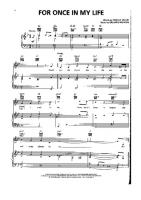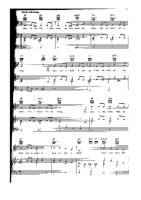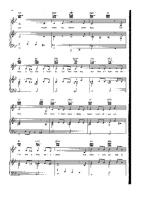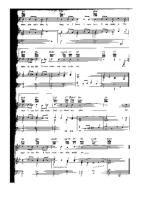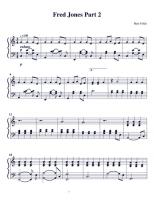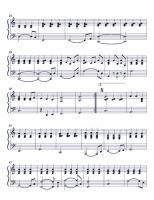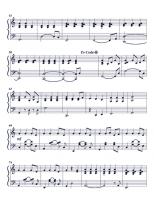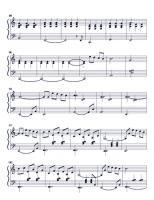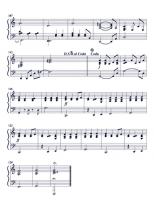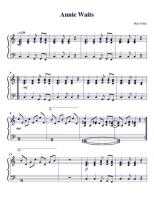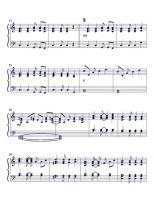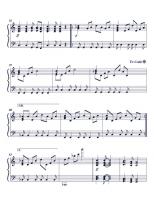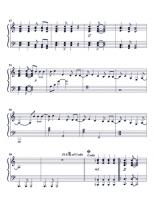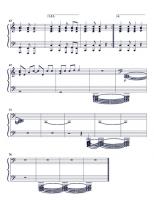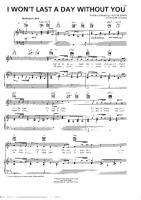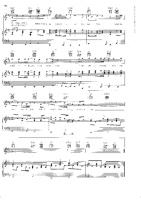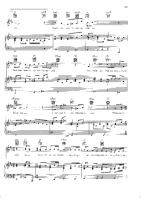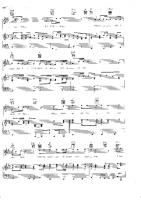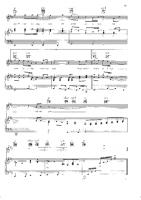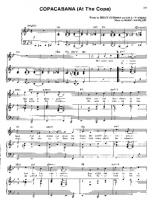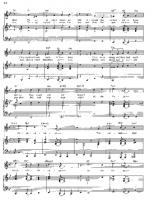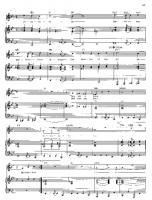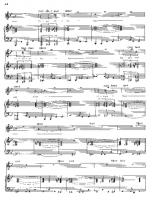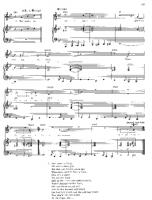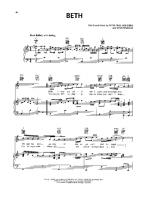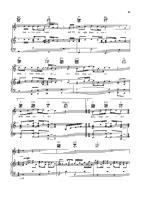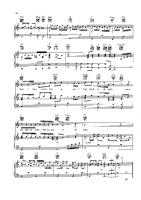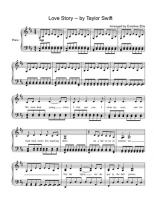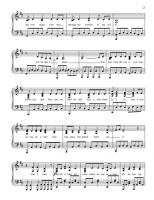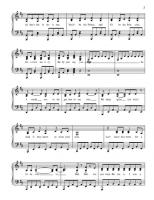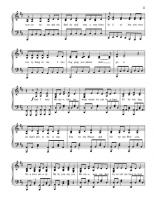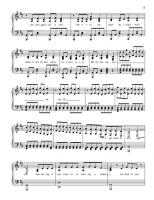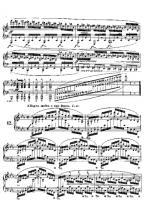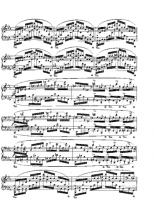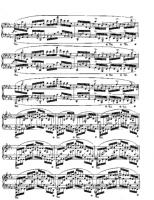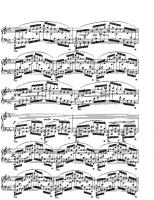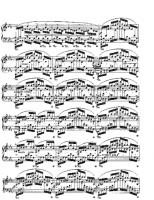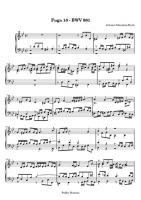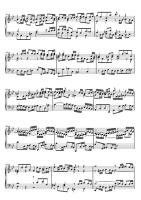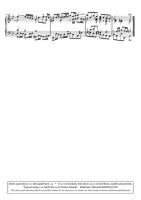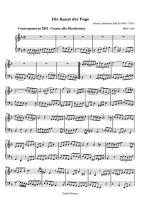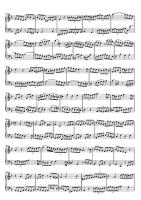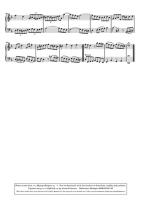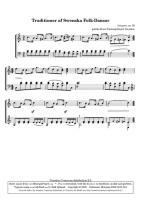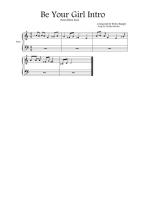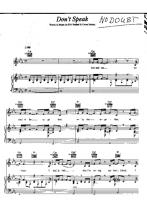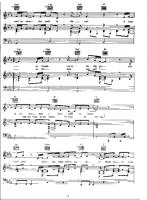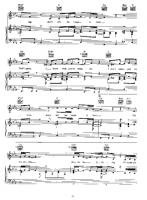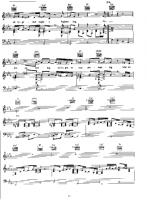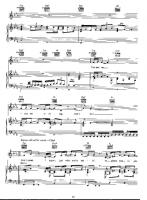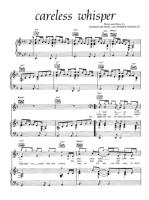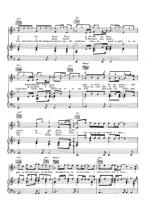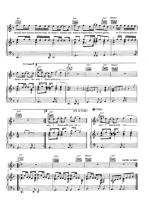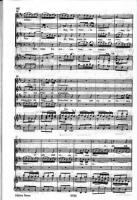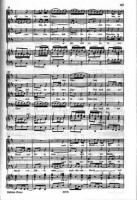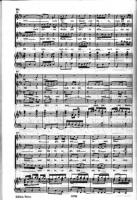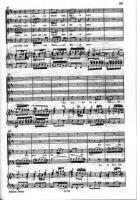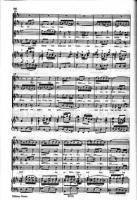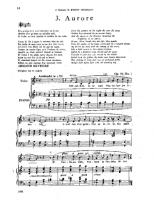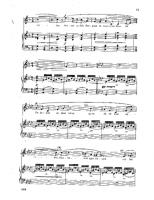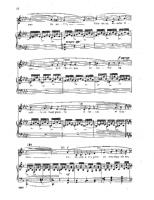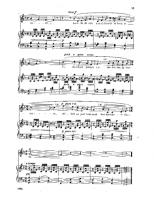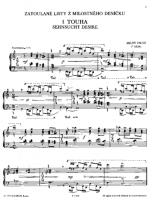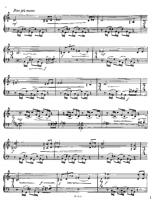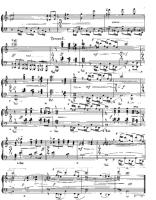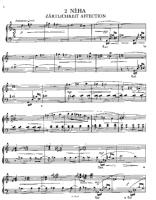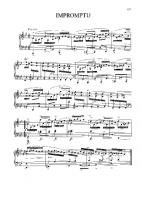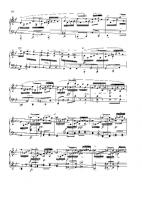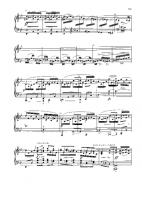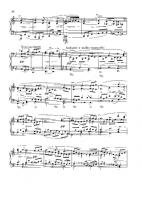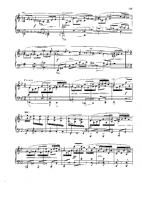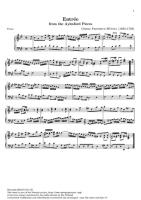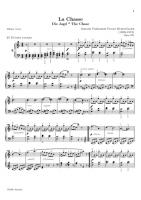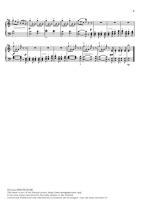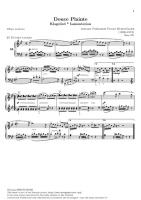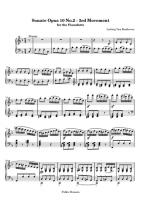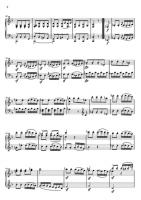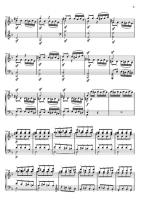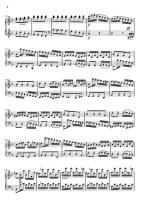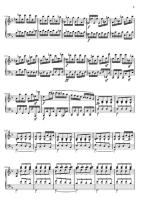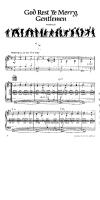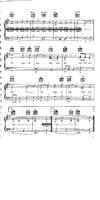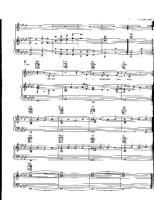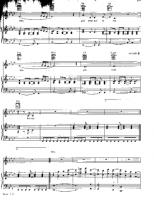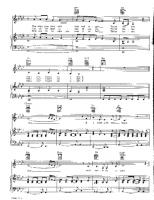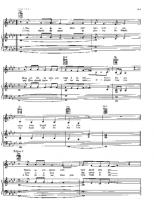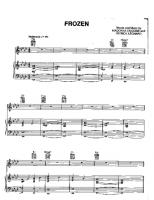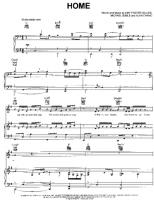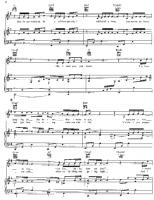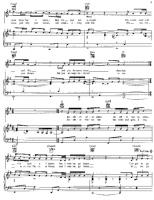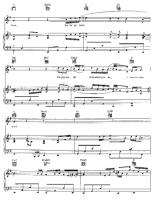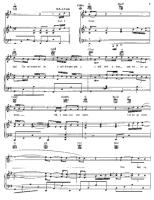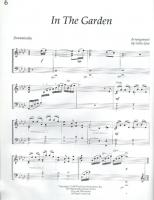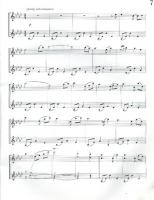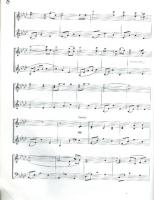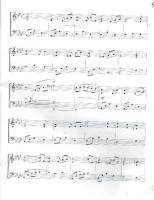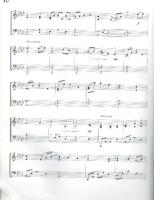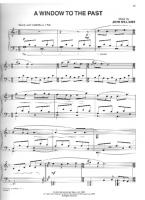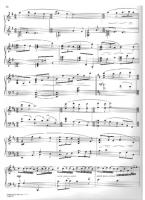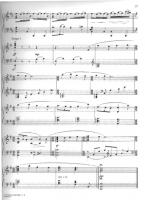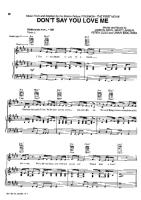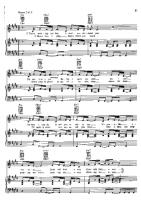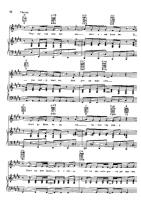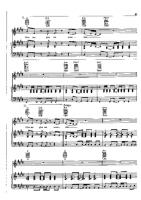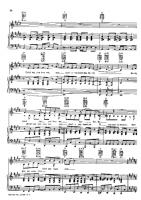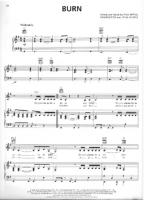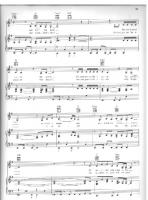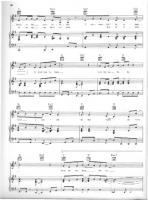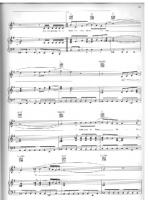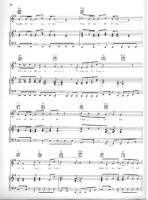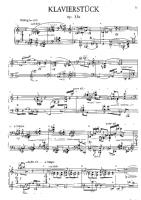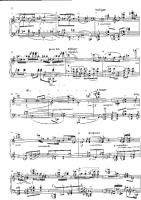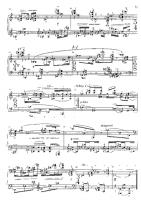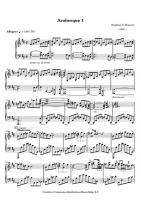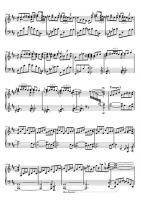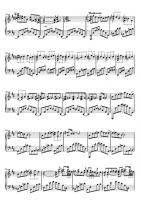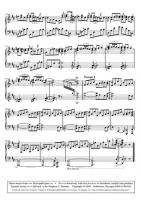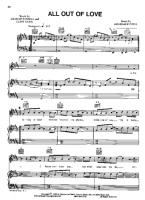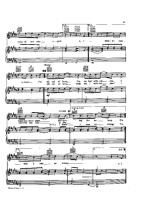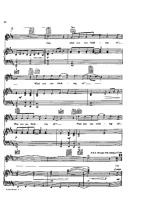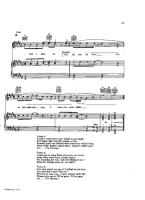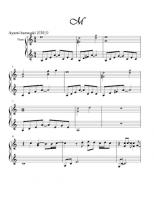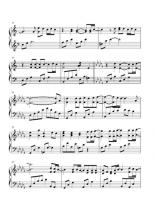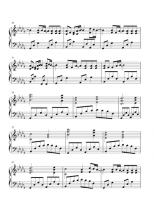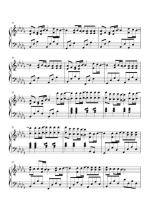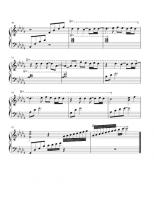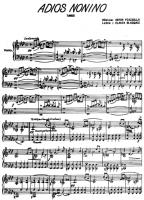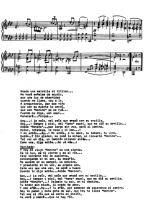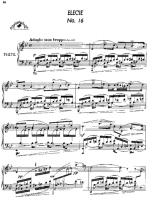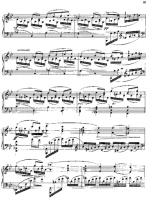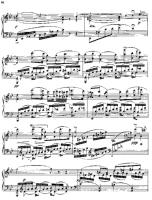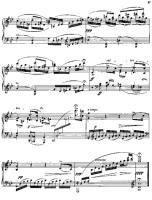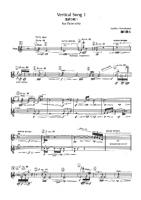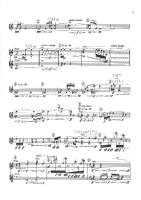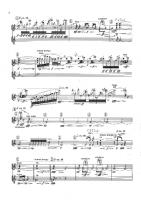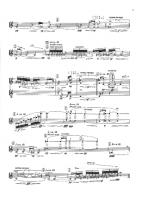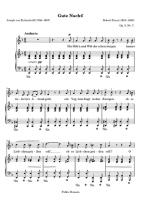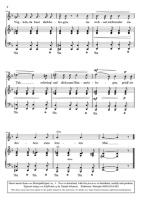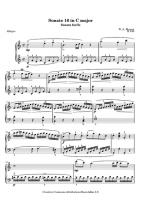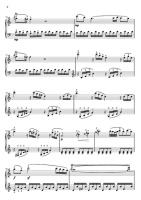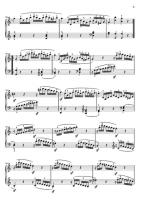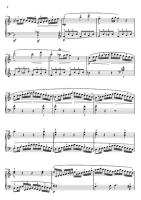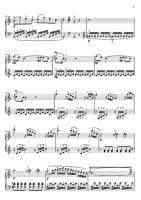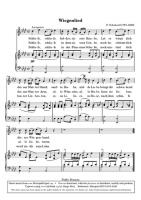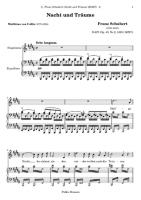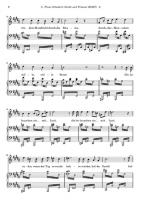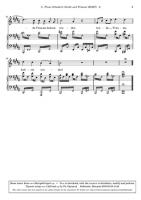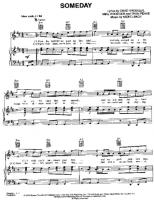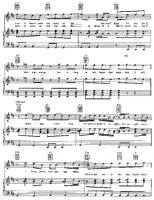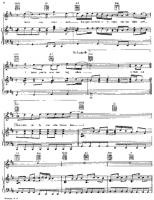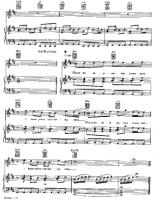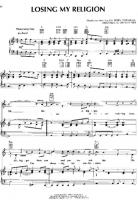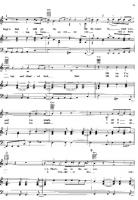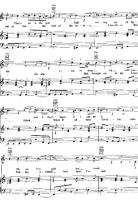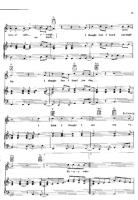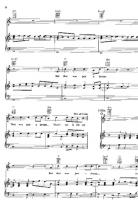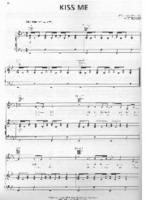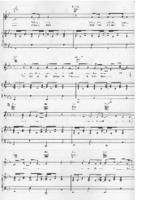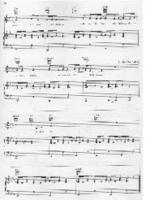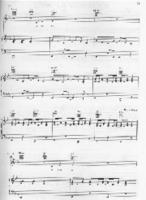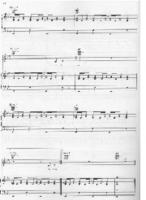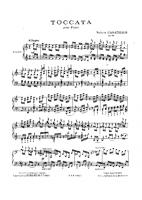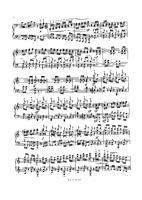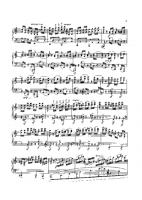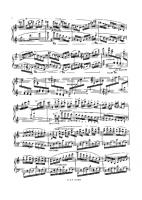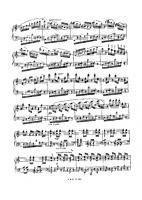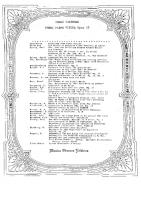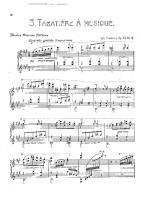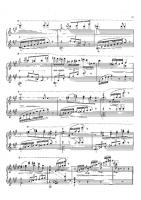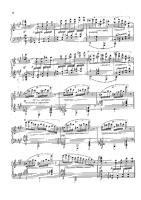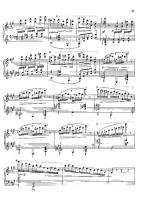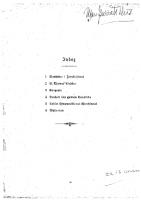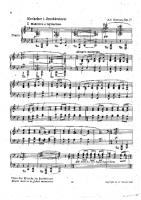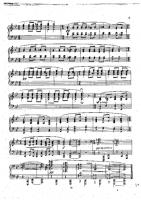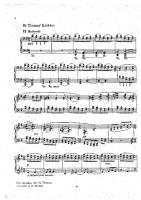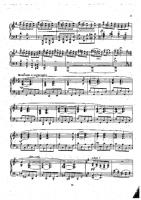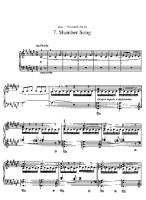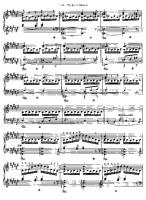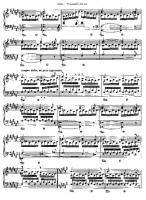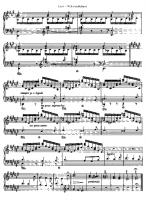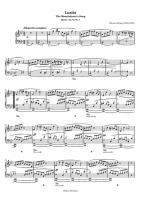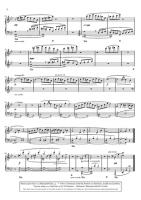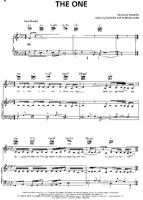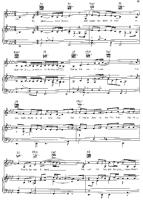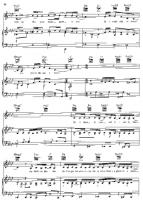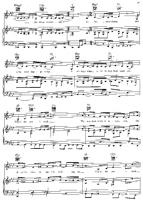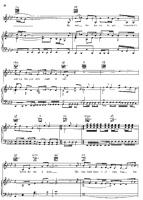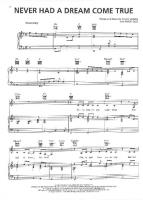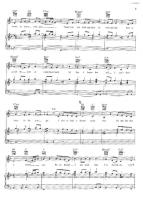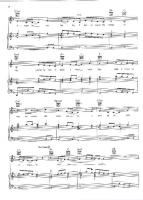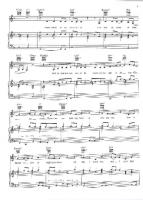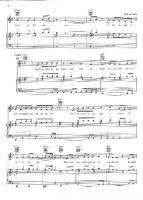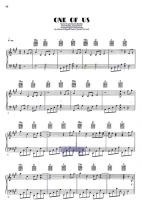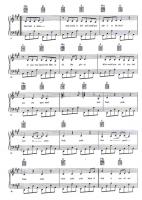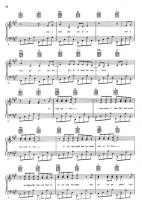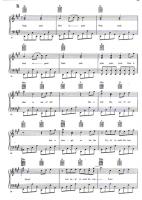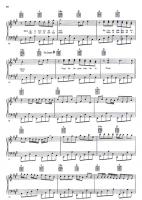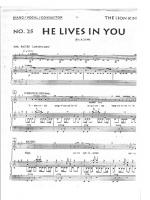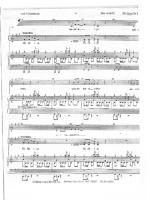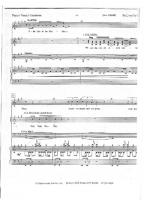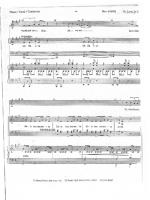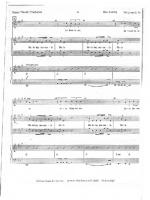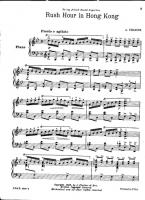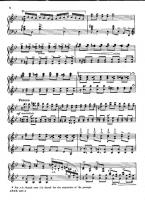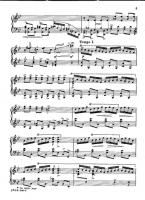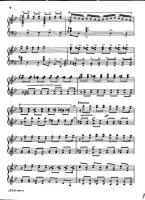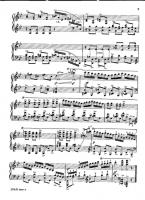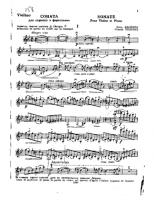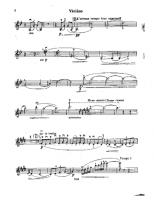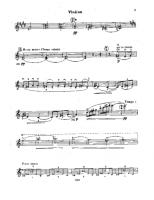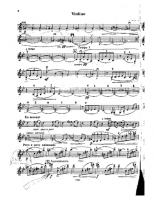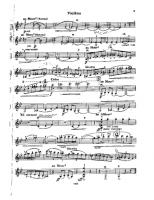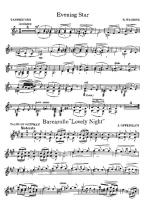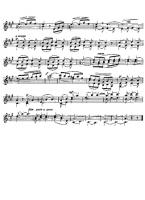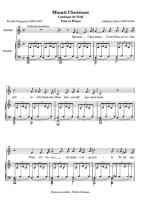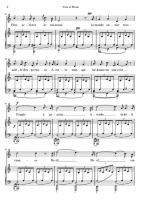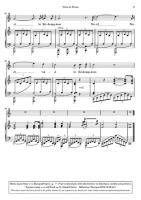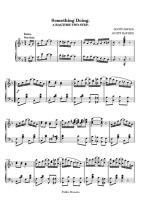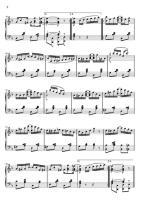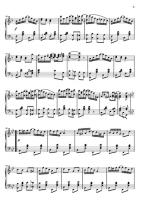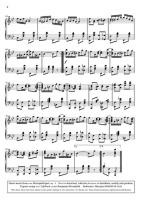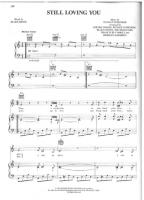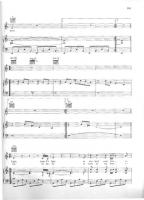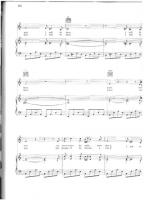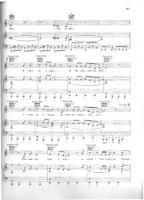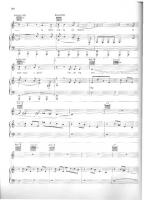Latest Sheets
Michael Buble
Michael Steven Bublé (born 9 September 1975) is a Canadian big band singer. He won several awards, including a Grammy and multiple Juno Awards. While achieving modest chart success in the United States, his 2003 self-titled album has reached the top ten in Lebanon, the UK and his home country. However, he did find commercial success in the U.S. with his 2005 album It's Time. He has sold over 18 million albums. Michael has also appeared on the TV series Rove four times.
The album Michael Bublé was released by Warner Bros. Records just before Valentine's Day in 2003. The album was actually first released by the Warner company in South Africa, where the album went into the Top 5 and was certified Gold. Soon after that, it entered the Canadian album charts. As success in the USA was marginal at best, Bublé started visiting countries all over the world, with the album being successful in places like the Philippines and Singapore. He then moved on to placed like Italy and eventually had chart success in the UK, U.S., Australia and elsewhere soon followed with the album going Platinum and reaching the top ten of the album charts in the UK and Canada and going all the way to #1 in Australia. The album has reached the top 50 of the Billboard 200 album charts in the U.S. His version of George Michael's "Kissing a Fool" was released as a single from the album and reached the top 30 of the Billboard Hot Adult Contemporary Tracks chart. "How Can You Mend a Broken Heart?" reached the top 30 of the Billboard Adult Contemporary chart as well. His third single "Sway" also reached the top 30 of the Adult Contemporary chart, while a Junkie XL remix of the song reached the top 20 in Australia in May 2004.
Bublé's second studio album, It's Time, debuted as a hugely successful performance. The album reached number 7 on the Billboard 200 album chart and number 2 on the ARIA Album Charts in Australia. It's Time also debuted at number 4 on the UK Album Charts. The album features covers of Beatles and Ray Charles songs, and the hit single "Home".
The album Michael Bublé was released by Warner Bros. Records just before Valentine's Day in 2003. The album was actually first released by the Warner company in South Africa, where the album went into the Top 5 and was certified Gold. Soon after that, it entered the Canadian album charts. As success in the USA was marginal at best, Bublé started visiting countries all over the world, with the album being successful in places like the Philippines and Singapore. He then moved on to placed like Italy and eventually had chart success in the UK, U.S., Australia and elsewhere soon followed with the album going Platinum and reaching the top ten of the album charts in the UK and Canada and going all the way to #1 in Australia. The album has reached the top 50 of the Billboard 200 album charts in the U.S. His version of George Michael's "Kissing a Fool" was released as a single from the album and reached the top 30 of the Billboard Hot Adult Contemporary Tracks chart. "How Can You Mend a Broken Heart?" reached the top 30 of the Billboard Adult Contemporary chart as well. His third single "Sway" also reached the top 30 of the Adult Contemporary chart, while a Junkie XL remix of the song reached the top 20 in Australia in May 2004.
Bublé's second studio album, It's Time, debuted as a hugely successful performance. The album reached number 7 on the Billboard 200 album chart and number 2 on the ARIA Album Charts in Australia. It's Time also debuted at number 4 on the UK Album Charts. The album features covers of Beatles and Ray Charles songs, and the hit single "Home".
Ben Folds
Benjamin Scott Folds (born September 12, 1966 in Winston-Salem, North Carolina) is an American singer and pianist. He originally gained fame as a member of the rock band, Ben Folds Five. Ben has released three solo albums: Fear of Pop: Volume 1, Rockin' the Suburbs, and Ben Folds Live. Fear of Pop was released while Ben Folds Five were still together; Suburbs and Live were released afterwards. Since Fear of Pop is highly experimental and Live is a collection of live solo recordings of mostly songs originally recorded with Ben Folds Five, Rockin' the Suburbs is Ben's first proper solo release. In late 2003 two solo EPs: Speed Graphic and Sunny 16 were released, with a third entitled Super D released in mid-2004. He currently resides in Adelaide, Australia with his wife, Frally Hynes, and two children, Louis and Grace. He tours Japan and the United States, as well as other parts of the world periodically.
Folds also produced and arranged the most recent William Shatner album, Has Been (2004); he previously worked with Shatner on the songs 'In Love' and 'Still in Love' for Fear of Pop.
Folds described his former band, Ben Folds Five, as 'punk rock for sissies,' and his oddball lyrics often contain nuances of depression, melancholy and self-conflict. While he was with the band Ben Folds Five and since his departure, Folds also provided a number of songs for films soundtrack. Some of these include 'Lonely Christmas Eve' for the film How the Grinch Stole Christmas! (2000) and a rendition of the Beatles' 'Golden Slumbers' for the film I Am Sam (2001).
On a planned tour of Australia, Folds teamed up with fellow namesakes Ben Kweller and Ben Lee to travel the country together as The Bens, at the suggestion of a fan on Ben Kweller's official website. The trio also went on to record an four-track EP together, entitled The Bens.
In summer of 2004, Folds co-headlined an American tour with fellow rockers Rufus Wainwright and Guster. His fourth solo album entitled 'Songs for Silverman' is slated for release on April 26, 2005.
Folds also produced and arranged the most recent William Shatner album, Has Been (2004); he previously worked with Shatner on the songs 'In Love' and 'Still in Love' for Fear of Pop.
Folds described his former band, Ben Folds Five, as 'punk rock for sissies,' and his oddball lyrics often contain nuances of depression, melancholy and self-conflict. While he was with the band Ben Folds Five and since his departure, Folds also provided a number of songs for films soundtrack. Some of these include 'Lonely Christmas Eve' for the film How the Grinch Stole Christmas! (2000) and a rendition of the Beatles' 'Golden Slumbers' for the film I Am Sam (2001).
On a planned tour of Australia, Folds teamed up with fellow namesakes Ben Kweller and Ben Lee to travel the country together as The Bens, at the suggestion of a fan on Ben Kweller's official website. The trio also went on to record an four-track EP together, entitled The Bens.
In summer of 2004, Folds co-headlined an American tour with fellow rockers Rufus Wainwright and Guster. His fourth solo album entitled 'Songs for Silverman' is slated for release on April 26, 2005.
The Carpenters
The Carpenters were a vocal and instrumental duo, consisting of siblings Karen and Richard Carpenter. Though often referred to by the public as "The Carpenters", the duo's official name on authorized recordings and press materials is simply "Carpenters", without the definite article. During a period in the 1970s when louder and wilder rock was in great demand, Richard and Karen produced a distinctively soft musical style that made them one of the best-selling music artists of all time.
The Carpenters' melodic pop charted a record-breaking score of hit recordings on the American Top 40 and Adult Contemporary charts, becoming leading sellers in the soft rock, easy listening and adult contemporary genres. The Carpenters had three #1 singles on the Billboard Hot 100 and fifteen #1 hits on the Adult Contemporary Chart (see The Carpenters discography). In addition, they had twelve top 10 singles (including their #1 hits). To date, The Carpenters' album and single sales total more than 100 million units.
During their fourteen-year career, The Carpenters recorded eleven albums, five of which contained top 10 singles (Close to You, Carpenters, A Song for You, Now & Then and Horizon), thirty-one singles, five television specials, and one short-lived television series. They toured in the United States, the United Kingdom, Japan, Australia, the Netherlands and Belgium. Their recording career ended with Karen's death on February 4, 1983. Karen passed away due to a cardiac arrest due to complications of anorexia nervosa. Extensive news coverage of the circumstances surrounding her death increased public awareness of the consequences of eating disorders.
The Carpenters' melodic pop charted a record-breaking score of hit recordings on the American Top 40 and Adult Contemporary charts, becoming leading sellers in the soft rock, easy listening and adult contemporary genres. The Carpenters had three #1 singles on the Billboard Hot 100 and fifteen #1 hits on the Adult Contemporary Chart (see The Carpenters discography). In addition, they had twelve top 10 singles (including their #1 hits). To date, The Carpenters' album and single sales total more than 100 million units.
During their fourteen-year career, The Carpenters recorded eleven albums, five of which contained top 10 singles (Close to You, Carpenters, A Song for You, Now & Then and Horizon), thirty-one singles, five television specials, and one short-lived television series. They toured in the United States, the United Kingdom, Japan, Australia, the Netherlands and Belgium. Their recording career ended with Karen's death on February 4, 1983. Karen passed away due to a cardiac arrest due to complications of anorexia nervosa. Extensive news coverage of the circumstances surrounding her death increased public awareness of the consequences of eating disorders.
Barry Manilow
Barry Manilow (born June 17, 1943) is an American singer-songwriter, musician, arranger, producer and conductor, best known for such recordings as I Write the Songs, Mandy, Weekend in New England and Copacabana.
Manilow's achievements include sales of more than 76 million records worldwide. In 1978, five of his albums were on the best-selling charts simultaneously; a feat equalled only by Frank Sinatra and Johnny Mathis. He has recorded a string of Billboard hit singles and multi-platinum albums that have resulted in his being named Radio & Records number one Adult Contemporary artist and winning three straight American Music Awards for Favorite Pop/Rock Male Artist. Several well-known entertainers have given Manilow their "stamp of approval," including Sinatra, who was quoted in the 1970s regarding Manilow, "He's next." In 1988, Bob Dylan stopped Manilow at a party, hugged him and said, "Don't stop what you're doing, man. We're all inspired by you." Arsenio Hall cited Manilow as a favorite guest on The Arsenio Hall Show and admonished his audience to respect him for his work.
As well as producing and arranging albums for other artists, such as Bette Midler, Dionne Warwick and Rosemary Clooney, Manilow has written songs for musicals, films, and commercials.
Since February 2005, he has been the headliner at the Las Vegas Hilton, and has performed hundreds of shows since.
Manilow's achievements include sales of more than 76 million records worldwide. In 1978, five of his albums were on the best-selling charts simultaneously; a feat equalled only by Frank Sinatra and Johnny Mathis. He has recorded a string of Billboard hit singles and multi-platinum albums that have resulted in his being named Radio & Records number one Adult Contemporary artist and winning three straight American Music Awards for Favorite Pop/Rock Male Artist. Several well-known entertainers have given Manilow their "stamp of approval," including Sinatra, who was quoted in the 1970s regarding Manilow, "He's next." In 1988, Bob Dylan stopped Manilow at a party, hugged him and said, "Don't stop what you're doing, man. We're all inspired by you." Arsenio Hall cited Manilow as a favorite guest on The Arsenio Hall Show and admonished his audience to respect him for his work.
As well as producing and arranging albums for other artists, such as Bette Midler, Dionne Warwick and Rosemary Clooney, Manilow has written songs for musicals, films, and commercials.
Since February 2005, he has been the headliner at the Las Vegas Hilton, and has performed hundreds of shows since.
Kiss
Kiss (also typeset as KISS) is an American rock band formed in New York City in December 1972. Easily identified by its members' trademark face paint and stage outfits, the group rose to prominence in the mid-1970s on the basis of their elaborate live performances, which featured fire-breathing, blood spitting, smoking guitars, and pyrotechnics. Kiss has been awarded 24 gold albums to date. The group's worldwide sales exceed 100 million albums.
The original lineup of Paul Stanley (vocals and rhythm guitar), Gene Simmons (vocals and bass guitar), Ace Frehley (lead guitar and vocals), and Peter Criss (drums, percussion and vocals) is the most successful and identifiable. With their makeup and costumes, they took on the personae of comic book-style characters: The Demon (Simmons), Starchild (Stanley), Spaceman (Frehley), and The Catman (Criss). The band explains that the fans were the ones who ultimately chose their makeup designs. The "Demon" makeup reflected Gene's cynicism and dark elements, as well as his love for comic books. Paul Stanley became the "Starchild" due to his tendency to be referred to as the "starry-eyed lover" and "hopeless romantic." Ace Frehley's "Spaceman" makeup was a reflection of him wanting to go for a ride in a space ship and supposedly being from another planet. Peter Criss' "Catman" makeup was in accordance with the belief that Peter had nine lives due to his rough childhood in Brooklyn. Due to creative differences, both Criss and Frehley were out of the group by 1982. The band's commercial fortunes had also waned considerably by that point.
In 1983, Kiss abandoned its makeup and enjoyed a commercial resurgence throughout the rest of the decade. Buoyed by a wave of Kiss nostalgia in the 1990s, the band announced a reunion of the original lineup (with makeup) in 1996. The resulting Kiss Alive/Worldwide/Lost Cities/Reunion Tour was the top-grossing act of 1996 and 1997. Criss and Frehley have since left Kiss again and have been replaced by Eric Singer and Tommy Thayer, respectively. The band continues to perform with makeup, while Stanley and Simmons have remained the only two constant members.
The original lineup of Paul Stanley (vocals and rhythm guitar), Gene Simmons (vocals and bass guitar), Ace Frehley (lead guitar and vocals), and Peter Criss (drums, percussion and vocals) is the most successful and identifiable. With their makeup and costumes, they took on the personae of comic book-style characters: The Demon (Simmons), Starchild (Stanley), Spaceman (Frehley), and The Catman (Criss). The band explains that the fans were the ones who ultimately chose their makeup designs. The "Demon" makeup reflected Gene's cynicism and dark elements, as well as his love for comic books. Paul Stanley became the "Starchild" due to his tendency to be referred to as the "starry-eyed lover" and "hopeless romantic." Ace Frehley's "Spaceman" makeup was a reflection of him wanting to go for a ride in a space ship and supposedly being from another planet. Peter Criss' "Catman" makeup was in accordance with the belief that Peter had nine lives due to his rough childhood in Brooklyn. Due to creative differences, both Criss and Frehley were out of the group by 1982. The band's commercial fortunes had also waned considerably by that point.
In 1983, Kiss abandoned its makeup and enjoyed a commercial resurgence throughout the rest of the decade. Buoyed by a wave of Kiss nostalgia in the 1990s, the band announced a reunion of the original lineup (with makeup) in 1996. The resulting Kiss Alive/Worldwide/Lost Cities/Reunion Tour was the top-grossing act of 1996 and 1997. Criss and Frehley have since left Kiss again and have been replaced by Eric Singer and Tommy Thayer, respectively. The band continues to perform with makeup, while Stanley and Simmons have remained the only two constant members.
Taylor Swift
Taylor Alison Swift (born December 13, 1989) is an American country-pop singer-songwriter. In 2006, she released her debut single "Tim McGraw", which peaked at number six on the Billboard country charts. Later in October 2006, she released her self-titled debut album, which produced five hit singles on the Billboard Hot Country Songs charts and was certified 3× Multi-Platinum by the RIAA. The New York Times described Swift as "one of pop's finest songwriters, country’s foremost pragmatist and more in touch with her inner life than most adults".
According to Nielsen SoundScan, Swift was the biggest selling artist of 2008 in America with combined sales of more than four million albums. Swift's Fearless and her self-titled album finished 2008 at number three and number six respectively, with sales of 2.1 and 1.5 million. She was the first artist in the history of Nielsen SoundScan to have two different albums in the Top 10 on the year end album chart. Fearless has topped the Billboard 200 in 11 non-consecutive weeks. No album has spent more time at number one since 1999-2000. It also was the first album by a female artist in country music history to log eight weeks at #1 on The Billboard 200. In mid-January 2009, Swift became the first country artist to top the 2 million mark in paid downloads with three different songs. As of the week ending February 8, 2009, Swift's single "Love Story" became the country song with most paid downloads in history and the first country song to top the Mainstream Top 40 chart. According to the 2009 issue of Forbes, Swift is ranked as the 69th most powerful celebrity with over $18 million dollars in earnings this year.
According to Nielsen SoundScan, Swift was the biggest selling artist of 2008 in America with combined sales of more than four million albums. Swift's Fearless and her self-titled album finished 2008 at number three and number six respectively, with sales of 2.1 and 1.5 million. She was the first artist in the history of Nielsen SoundScan to have two different albums in the Top 10 on the year end album chart. Fearless has topped the Billboard 200 in 11 non-consecutive weeks. No album has spent more time at number one since 1999-2000. It also was the first album by a female artist in country music history to log eight weeks at #1 on The Billboard 200. In mid-January 2009, Swift became the first country artist to top the 2 million mark in paid downloads with three different songs. As of the week ending February 8, 2009, Swift's single "Love Story" became the country song with most paid downloads in history and the first country song to top the Mainstream Top 40 chart. According to the 2009 issue of Forbes, Swift is ranked as the 69th most powerful celebrity with over $18 million dollars in earnings this year.
Chopin
Frédéric Chopin (1 March 1810 – 17 October 1849) was a Polish composer and virtuoso pianist of the Romantic period. He is widely regarded as the greatest Polish composer, and ranks as one of music's greatest tone poets.
He was born in the village of Żelazowa Wola, in the Duchy of Warsaw, to a Polish mother and French-expatriate father, and in his early life was regarded as a child-prodigy pianist. In November 1830, at the age of 20, Chopin went abroad; following the suppression of the Polish November Uprising of 1830–31, he became one of many expatriates of the Polish "Great Emigration."
In Paris, he made a comfortable living as a composer and piano teacher, while giving few public performances. A Polish patriot,
Chopin's extant compositions were written primarily for the piano as a solo instrument. Though technically demanding, Chopin's style emphasizes nuance and expressive depth rather than virtuosity. Chopin invented musical forms such as the ballade and was responsible for major innovations in forms such as the piano sonata, waltz, nocturne, étude, impromptu and prelude. His works are mainstays of Romanticism in 19th-century classical music.
He was born in the village of Żelazowa Wola, in the Duchy of Warsaw, to a Polish mother and French-expatriate father, and in his early life was regarded as a child-prodigy pianist. In November 1830, at the age of 20, Chopin went abroad; following the suppression of the Polish November Uprising of 1830–31, he became one of many expatriates of the Polish "Great Emigration."
In Paris, he made a comfortable living as a composer and piano teacher, while giving few public performances. A Polish patriot,
Chopin's extant compositions were written primarily for the piano as a solo instrument. Though technically demanding, Chopin's style emphasizes nuance and expressive depth rather than virtuosity. Chopin invented musical forms such as the ballade and was responsible for major innovations in forms such as the piano sonata, waltz, nocturne, étude, impromptu and prelude. His works are mainstays of Romanticism in 19th-century classical music.
J. S. Bach
Johann Sebastian Bach (21 March 1685, O.S.31 March 1685, N.S. – 28 July 1750, N.S.) was a German composer, organist, harpsichordist, violist, and violinist whose sacred and secular works for choir, orchestra, and solo instruments drew together the strands of the Baroque period and brought it to its ultimate maturity. Although he did not introduce new forms, he enriched the prevailing German style with a robust contrapuntal technique, an unrivalled control of harmonic and motivic organisation, and the adaptation of rhythms, forms and textures from abroad, particularly from Italy and France.
Revered for their intellectual depth, technical command and artistic beauty, Bach's works include the Brandenburg Concertos, the Goldberg Variations, the Partitas, The Well-Tempered Clavier, the Mass in B minor, the St Matthew Passion, the St John Passion, the Magnificat, A Musical Offering, The Art of Fugue, the English and French Suites, the Sonatas and Partitas for solo violin, the Cello Suites, more than 200 surviving cantatas, and a similar number of organ works, including the famous Toccata and Fugue in D minor and Passacaglia and Fugue in C minor, as well as the Great Eighteen Chorale Preludes and Organ Mass.
Bach's abilities as an organist were highly respected throughout Europe during his lifetime, although he was not widely recognised as a great composer until a revival of interest and performances of his music in the first half of the 19th century. He is now generally regarded as one of the main composers of the Baroque style, and as one of the greatest composers of all time.
Revered for their intellectual depth, technical command and artistic beauty, Bach's works include the Brandenburg Concertos, the Goldberg Variations, the Partitas, The Well-Tempered Clavier, the Mass in B minor, the St Matthew Passion, the St John Passion, the Magnificat, A Musical Offering, The Art of Fugue, the English and French Suites, the Sonatas and Partitas for solo violin, the Cello Suites, more than 200 surviving cantatas, and a similar number of organ works, including the famous Toccata and Fugue in D minor and Passacaglia and Fugue in C minor, as well as the Great Eighteen Chorale Preludes and Organ Mass.
Bach's abilities as an organist were highly respected throughout Europe during his lifetime, although he was not widely recognised as a great composer until a revival of interest and performances of his music in the first half of the 19th century. He is now generally regarded as one of the main composers of the Baroque style, and as one of the greatest composers of all time.
Traditional
traditional music
Elfen Lied
Elfen Lied (エルフェンリート Erufen Rīto?) is a Japanese manga series created by manga author Lynn Okamoto. A thirteen-episode anime television series adaptation based on the manga was produced by the studio ARMS and broadcast on TV Tokyo from July to October 2004; the anime was later licensed in North America on DVD by ADV Films. The anime started before the manga was complete; as a result, the plot differed between the two, especially towards the ending of the story. In 2005, a special original video animation, written to occur between the tenth and eleventh episodes of the series, was released. The title is German for "Elf Song" and takes its name from the poem "Elfenlied".
Elfen Lied revolves around the interactions, views, emotions, and differences between humans and the Diclonius, a mutant species similar to humans in build but distinguishable by two horns on their head and "vectors", transparent telekinetically controlled arms that have the power to manipulate and cut objects within their reach. The series is centered on the teenage Diclonius girl "Lucy" who was rejected by humans and subsequently wants revenge.
Elfen Lied involves themes of social alienation, identity, prejudice, revenge, abuse, jealousy, regret and the value of humanity. The series employs graphic violence. So far, only the thirteen-episode anime series has been licensed in the United States, by ADV Films and in Australia, by Madman Entertainment. ADV Films said the series was one of their bestselling and "most notorious" releases of 2005.
Elfen Lied revolves around the interactions, views, emotions, and differences between humans and the Diclonius, a mutant species similar to humans in build but distinguishable by two horns on their head and "vectors", transparent telekinetically controlled arms that have the power to manipulate and cut objects within their reach. The series is centered on the teenage Diclonius girl "Lucy" who was rejected by humans and subsequently wants revenge.
Elfen Lied involves themes of social alienation, identity, prejudice, revenge, abuse, jealousy, regret and the value of humanity. The series employs graphic violence. So far, only the thirteen-episode anime series has been licensed in the United States, by ADV Films and in Australia, by Madman Entertainment. ADV Films said the series was one of their bestselling and "most notorious" releases of 2005.
No Doubt
No Doubt is a rock band from Anaheim, California, United States, founded in 1986. The ska-rock sound of its first album failed to make waves due to the popularity of the grunge movement at the time. The band's diamond-certified album Tragic Kingdom helped to launch the ska revival of the 1990s, and "Don't Speak", the third single from the album, set a record when it spent sixteen weeks at the number one spot on the Billboard Hot 100 Airplay chart, later broken by the Goo Goo Dolls' "Iris".
The group released its next album, Return of Saturn, four years later, but despite positive reviews, the album was considered a commercial failure. Fifteen months later, the band reappeared with Rock Steady, which incorporated reggae and dancehall music into their work. The album was primarily recorded in Jamaica and featured collaborations with Jamaican artists Bounty Killer, Sly and Robbie, and Lady Saw. The album produced two Grammy-winning singles, "Hey Baby" and "Underneath It All".
No Doubt released the compilation The Singles 1992-2003 and box set Boom Box in 2003, both of which contained a cover version of the Talk Talk synthpop song "It's My Life". Frontwoman Gwen Stefani launched her solo career the next year with several collaborations, including bandmate Tony Kanal and Neptune Pharrell, while guitarist Tom Dumont began his side project, Invincible Overlord. During its career, the band has won two Grammy Awards and sold 27 million records worldwide to date.
The group released its next album, Return of Saturn, four years later, but despite positive reviews, the album was considered a commercial failure. Fifteen months later, the band reappeared with Rock Steady, which incorporated reggae and dancehall music into their work. The album was primarily recorded in Jamaica and featured collaborations with Jamaican artists Bounty Killer, Sly and Robbie, and Lady Saw. The album produced two Grammy-winning singles, "Hey Baby" and "Underneath It All".
No Doubt released the compilation The Singles 1992-2003 and box set Boom Box in 2003, both of which contained a cover version of the Talk Talk synthpop song "It's My Life". Frontwoman Gwen Stefani launched her solo career the next year with several collaborations, including bandmate Tony Kanal and Neptune Pharrell, while guitarist Tom Dumont began his side project, Invincible Overlord. During its career, the band has won two Grammy Awards and sold 27 million records worldwide to date.
George Michael
Georgios Kyriacos Panayiotou (born June 25, 1963) best known as George Michael, is a two-time Grammy Award winning, English singer-songwriter, who has had a career as frontman of the duo Wham! as well as a soul-influenced, solo pop musician. He has sold over 100 million records worldwide, encompassing 12 British #1 singles, 7 British #1 albums, 10 US #1 singles, and 2 US #1 albums. His 1987 debut solo album, Faith became one of the best selling albums of all time, and also the first album to produce six top 5 singles in the United States and it has sold over 20 million copies worldwide. All four of his solo studio albums have all reached #1 on the U.K. charts and have gone on to become huge international successes. This success has made George Michael the most played artist on British radio over the past two decades.
Bach
Johann Sebastian Bach (31 March 1685 – 28 July 1750) was a German composer and organist whose sacred and secular works for choir, orchestra, and solo instruments drew together the strands of the Baroque period and brought it to its ultimate maturity. Although he introduced no new forms, he enriched the prevailing German style with a robust contrapuntal technique, an unrivalled control of harmonic and motivic organisation in composition for diverse musical forces, and the adaptation of rhythms and textures from abroad, particularly Italy and France.
Revered for their intellectual depth and technical and artistic beauty, Bach's works include the Brandenburg concertos; the Goldberg Variations; the English Suites, French Suites, Partitas, and Well-Tempered Clavier; the Mass in B Minor; the St. Matthew Passion; the St. John Passion; The Musical Offering; The Art of Fugue; the Sonatas and Partitas for violin solo; the Cello Suites; more than 200 surviving cantatas; and a similar number of organ works, including the celebrated Toccata and Fugue in D Minor.
While Bach's fame as an organist was great during his lifetime, he was not particularly well-known as a composer. His adherence to Baroque forms and contrapuntal style was considered "old-fashioned" by his contemporaries, especially late in his career when the musical fashion tended towards Rococo and later Classical styles. A revival of interest and performances of his music began early in the 19th century, and he is now widely considered to be one of the greatest composers in the Western tradition.
Revered for their intellectual depth and technical and artistic beauty, Bach's works include the Brandenburg concertos; the Goldberg Variations; the English Suites, French Suites, Partitas, and Well-Tempered Clavier; the Mass in B Minor; the St. Matthew Passion; the St. John Passion; The Musical Offering; The Art of Fugue; the Sonatas and Partitas for violin solo; the Cello Suites; more than 200 surviving cantatas; and a similar number of organ works, including the celebrated Toccata and Fugue in D Minor.
While Bach's fame as an organist was great during his lifetime, he was not particularly well-known as a composer. His adherence to Baroque forms and contrapuntal style was considered "old-fashioned" by his contemporaries, especially late in his career when the musical fashion tended towards Rococo and later Classical styles. A revival of interest and performances of his music began early in the 19th century, and he is now widely considered to be one of the greatest composers in the Western tradition.
Faure
Vacek
Dvorak
Antonín Leopold Dvořák (September 8, 1841 – May 1, 1904) was a Czech composer of Romantic music, who employed the idioms and melodies of the folk music of his native Bohemia and Moravia. His works include operas, symphonic, choral and chamber music. His best-known works are his New World Symphony (particularly the slow movement), as well as his Slavonic Dances, American String Quartet, and Cello Concerto in B minor.
Dvořák wrote in a variety of forms: his nine symphonies generally stick to classical models that Beethoven would have recognised, but he also worked in the newly developed symphonic poem form and the influence of Richard Wagner is apparent in some works. Many of his works also show the influence of Czech folk music, both in terms of rhythms and melodic shapes; perhaps the best known examples are the two sets of Slavonic Dances. Dvořák also wrote operas (the best known of which is Rusalka); serenades for string orchestra and wind ensemble; chamber music (including a number of string quartets, and quintets); songs; choral music; and piano music.
Dvořák wrote in a variety of forms: his nine symphonies generally stick to classical models that Beethoven would have recognised, but he also worked in the newly developed symphonic poem form and the influence of Richard Wagner is apparent in some works. Many of his works also show the influence of Czech folk music, both in terms of rhythms and melodic shapes; perhaps the best known examples are the two sets of Slavonic Dances. Dvořák also wrote operas (the best known of which is Rusalka); serenades for string orchestra and wind ensemble; chamber music (including a number of string quartets, and quintets); songs; choral music; and piano music.
G. F. Handel
George Frideric Handel (German: Georg Friedrich Händel; pronounced ) (23 February 1685 – 14 April 1759) was a German-English Baroque composer who is famous for his operas, oratorios, and concerti grossi. Handel was born in Germany in the same year as JS Bach and Domenico Scarlatti. He received critical musical training in Italy before settling in London and becoming a naturalised British subject. His works include Messiah, Water Music, and Music for the Royal Fireworks. He was strongly influenced by the techniques of the great composers of the Italian Baroque and the English composer Henry Purcell. Handel's music was well-known to many composers, including Haydn, Mozart, and Beethoven.
J. F. F. Burgmüller
L. V. Beethoven
Anonymous
Easy piano sheets to teach kids how to play piano.
Madonna
Madonna Louise Ciccone Ritchie (born August 16, 1958), known as Madonna, is an American recording artist and entertainer. Born in Bay City, Michigan and raised in Rochester Hills, Michigan, Madonna moved to New York City for a career in modern dance. After performing as member of the pop musical groups Breakfast Club and Emmy, she released her self-titled debut album in 1983, and then produced three consecutive number-one studio albums on the Billboard 200 in the 1980s.
Madonna is known for her works that explore religious symbolism and sexual themes which also drew criticism from the Vatican in the late 1980s. In 1992, she founded an entertainment company, Maverick, which published a book of photographs (Sex). She also released a studio album (Erotica) and starred in a film (Body of Evidence) with erotic themes. These works generated negative publicity and coincided with a fall in commercial sales in the 1990s. Madonna's career was revived in 1998, when the release of her album Ray of Light garnered critical acclaim. She subsequently made four consecutive number-one studio albums.
Madonna has acted in 22 films. Although several failed critically and commercially, she earned a Golden Globe Award for her role in the 1996 film Evita. Divorced from actor Sean Penn, Madonna bore a daughter by personal trainer Carlos Leon before marrying film director Guy Ritchie. She and Richie have a son and in 2008 they adopted a second, Malawian David Banda, over media allegations they violated that country's adoption laws.
Madonna is known for her works that explore religious symbolism and sexual themes which also drew criticism from the Vatican in the late 1980s. In 1992, she founded an entertainment company, Maverick, which published a book of photographs (Sex). She also released a studio album (Erotica) and starred in a film (Body of Evidence) with erotic themes. These works generated negative publicity and coincided with a fall in commercial sales in the 1990s. Madonna's career was revived in 1998, when the release of her album Ray of Light garnered critical acclaim. She subsequently made four consecutive number-one studio albums.
Madonna has acted in 22 films. Although several failed critically and commercially, she earned a Golden Globe Award for her role in the 1996 film Evita. Divorced from actor Sean Penn, Madonna bore a daughter by personal trainer Carlos Leon before marrying film director Guy Ritchie. She and Richie have a son and in 2008 they adopted a second, Malawian David Banda, over media allegations they violated that country's adoption laws.
Beauty and the Beast
Beauty and the Beast is a 1991 animated American family film. It is the thirtieth animated feature produced by Walt Disney Feature Animation. The film received its premiere at the El Capitan Theatre in Hollywood on November 13, 1991. This film, one of the best known of the Disney studio's films, is based on the well-known fairy tale Beauty and the Beast, about a beautiful woman kept in a castle by a horrific monster. It is the first and only full-length animated feature film to ever be nominated for an Academy Award for Best Picture (it lost to The Silence of the Lambs). Heightening the level of performance in the era known as the Disney Renaissance (1989-1999, beginning with The Little Mermaid and ending with Tarzan ), many animated films following its release have been influenced by its blending of traditional animation and computer generated imagery.
Beauty and the Beast ranked 7th on the American Film Institutes's list of best animated films, #22 on the Institutes's list of best musicals and #34 on its list of the best romantic American movies. On the list of the greatest songs from American movies, Beauty and the Beast ranked #62. The film was adapted into a Broadway musical of the same name, which ran from 1994 to 2007.
In 2002, Beauty and the Beast was added to the United States National Film Registry as being deemed "culturally, historically, or aesthetically significant." In January of the same year, the film was reissued in IMAX format in a special edition edit including a new musical sequence. A two-disc Platinum Edition DVD release followed in October.
Beauty and the Beast ranked 7th on the American Film Institutes's list of best animated films, #22 on the Institutes's list of best musicals and #34 on its list of the best romantic American movies. On the list of the greatest songs from American movies, Beauty and the Beast ranked #62. The film was adapted into a Broadway musical of the same name, which ran from 1994 to 2007.
In 2002, Beauty and the Beast was added to the United States National Film Registry as being deemed "culturally, historically, or aesthetically significant." In January of the same year, the film was reissued in IMAX format in a special edition edit including a new musical sequence. A two-disc Platinum Edition DVD release followed in October.
Lorie Line
Lorie Line is a pianist and performer from Minneapolis, Minnesota. She has released over 20 albums and tours every year during the Christmas season.
She grew up in Reno, Nevada studying classical piano. At the age of 9, she entered and won annual Statewide competitions until the age of 18, where she enrolled at the University of Nevada, Reno. She received her B.A. in Music, Piano Performance.
Shortly after getting her degree, she and her husband, Tim, relocated to Minneapolis because of his job transfer. Using her piano performance degree, she auditioned for Dayton's and became a full-time pianist, serenading shoppers. It was here (1988-1993) that many fans first came to hear Lorie Line play the piano for the first time. the "shoppers" encouraged Lorie to record her own CD. She did, and became both pianist and vendor at the same time. Little did she know that she was onto something big.
Since then, Lorie Line has turned piano playing into one of the largest independent record companies in the world, Lorie Line Music, Inc. She has sold over 5 million albums, has published over 20 books of music, and has recorded 27 CDs. She, and members of her Pop Chamber Orchestra, performs to 100,000 people on over 85 stages a year. She tours spring, summer, fall and winter.
She grew up in Reno, Nevada studying classical piano. At the age of 9, she entered and won annual Statewide competitions until the age of 18, where she enrolled at the University of Nevada, Reno. She received her B.A. in Music, Piano Performance.
Shortly after getting her degree, she and her husband, Tim, relocated to Minneapolis because of his job transfer. Using her piano performance degree, she auditioned for Dayton's and became a full-time pianist, serenading shoppers. It was here (1988-1993) that many fans first came to hear Lorie Line play the piano for the first time. the "shoppers" encouraged Lorie to record her own CD. She did, and became both pianist and vendor at the same time. Little did she know that she was onto something big.
Since then, Lorie Line has turned piano playing into one of the largest independent record companies in the world, Lorie Line Music, Inc. She has sold over 5 million albums, has published over 20 books of music, and has recorded 27 CDs. She, and members of her Pop Chamber Orchestra, performs to 100,000 people on over 85 stages a year. She tours spring, summer, fall and winter.
Harry Potter and the Prisoner of Azkaban
Harry Potter and the Prisoner of Azkaban is a 2004 fantasy adventure film, based on the novel of the same name by J. K. Rowling. Directed by Alfonso Cuarón, it is the third film in the popular Harry Potter series. It stars Daniel Radcliffe as the teenage wizard Harry Potter, and Rupert Grint and Emma Watson as Harry's best friends Ron Weasley and Hermione Granger. Gary Oldman and David Thewlis joined the cast as the new characters Sirius Black and Remus Lupin. In this movie, the role of Albus Dumbledore was played by Michael Gambon who took over from the late Richard Harris who died of Hodgkin's disease. Steve Kloves returned as screenwriter, while Chris Columbus (the director of the previous two films) became a producer, alongside David Heyman. The film was released on 31 May 2004 in the United Kingdom and on 4 June 2004 in the United States as the first film released into IMAX theaters.
The film was nominated for two Academy Awards — Academy Award for Original Music Score and Academy Award for Visual Effects at the 77th Academy Awards held in 2005.
The film was nominated for two Academy Awards — Academy Award for Original Music Score and Academy Award for Visual Effects at the 77th Academy Awards held in 2005.
Pokemon
Pokémon, also known as Pocket Monsters in Japan, is a Japanese media franchise managed by The Pokémon Company, a company founded by Nintendo, Game Freak, and Creatures. The franchise was created by Satoshi Tajiri in 1995, and is centered on fictional creatures called "Pokémon", which humans, known as Pokémon Trainers, catch and train to battle each other for sport. Works within the franchise are set in the Pokémon universe. The English slogan for the franchise is "Gotta Catch 'Em All".
Usher
Usher Raymond IV (born October 14, 1978), known simply by his first name Usher, is an American R&B and pop singer-songwriter and actor who rose to fame in the 1990s. To date, he has sold approximately 30 million albums worldwide and has won five Grammy Awards. Usher is a part owner of the Cleveland Cavaliers franchise, and has his own record label, US Records. On September 13, 2008 Usher has been inducted into the All time Hot 100 Artist by the Billboard Hot 100. He is one of the few artists of his generation to be mentioned.
Schoenberg
S. C. Doonan
Air Supply
Air Supply is a soft rock duo who had a succession of hits worldwide through the late 1970s and early 1980s. It consists of British guitarist and vocalist Graham Russell (born Graham Cyril Russell, 11 June 1950, Sherwood, Nottingham, England, UK) and Australian lead vocalist Russell Hitchcock (born Russell Charles Hitchcock, 15 June 1949, Melbourne, Victoria, Australia).
Ayumi Hamasaki
Ayumi Hamasaki (born October 2, 1978), is a Japanese singer-songwriter and former actress. Also known as Ayu to her fans, Hamasaki has been dubbed the "Empress of pop" and "the Empress of J-Pop" due to her popularity and widespread influence in Japan. Born and raised in Fukuoka, she moved to Tokyo at fourteen to pursue a career in entertainment. In 1998, under the tutelage of Avex CEO Max Matsuura, she released a string of modestly selling singles that concluded with her 1999 debut album A Song for XX, which debuted atop the Oricon charts and stayed there for four weeks in a row, establishing her popularity in Japan.
Because of her constantly changing image and tight control over her artistry, Hamasaki has become a "trendsetter" and an "icon of fashion" in Asia; her popularity and influence in music and fashion extend to China, Singapore, Taiwan, and South Korea. She has appeared in or lent her songs to many advertisements and television commercials. Though she originally supported this, a 2001 event in which Avex forced her to put her greatest hits album in direct competition with Hikaru Utada's Distance made Hamasaki reconsider and eventually oppose her status as an Avex "product".
Since her 1998 debut with the single "Poker Face", Hamasaki has sold around 50 million records, making her one of Japan's best-selling singers.
Because of her constantly changing image and tight control over her artistry, Hamasaki has become a "trendsetter" and an "icon of fashion" in Asia; her popularity and influence in music and fashion extend to China, Singapore, Taiwan, and South Korea. She has appeared in or lent her songs to many advertisements and television commercials. Though she originally supported this, a 2001 event in which Avex forced her to put her greatest hits album in direct competition with Hikaru Utada's Distance made Hamasaki reconsider and eventually oppose her status as an Avex "product".
Since her 1998 debut with the single "Poker Face", Hamasaki has sold around 50 million records, making her one of Japan's best-selling singers.
Astor Piazzolla
Ástor Pantaleón Piazzolla (March 11, 1921 – July 4, 1992) was an Argentine tango composer and bandoneón player. His oeuvre revolutionized the traditional tango into a new style termed nuevo tango, incorporating elements from jazz and classical music. An excellent bandoneonist, he regularly performed his own compositions with different ensembles.
Piazzolla's nuevo tango was distinct from the traditional tango in its incorporation of elements of jazz, its use of extended harmonies and dissonance, its use of counterpoint, and its ventures into extended compositional forms. As Argentine psychoanalyst Carlos Kuri has pointed out, Piazzolla's fusion of tango with this wide range of other recognizable Western musical elements was so successful that it produced a new individual style transcending these influences. It is precisely this success, and individuality, that makes it hard to pin down where particular influences reside in his compositions, but some aspects are clear. The use of the passacaglia technique of a circulating bass line and harmonic sequence, invented and much used in 17th and 18th century baroque music but also central to the idea of jazz "changes", predominates in most of Piazzolla's mature compositions. Another clear reference to the baroque is the often complex and virtuosic counterpoint that sometimes follows strict fugal behavior but more often simply allows each performer in the group to assert his voice. A further technique that emphasises this sense of democracy and freedom among the musicians is improvisation that is borrowed from jazz in concept, but in practice involves a different vocabulary of scales and rhythms that stay within the parameters of the established tango sound-world. Pablo Ziegler has been particularly responsible for developing this aspect of the style both within Piazzolla's groups and since the composer's death.
Piazzolla's nuevo tango was distinct from the traditional tango in its incorporation of elements of jazz, its use of extended harmonies and dissonance, its use of counterpoint, and its ventures into extended compositional forms. As Argentine psychoanalyst Carlos Kuri has pointed out, Piazzolla's fusion of tango with this wide range of other recognizable Western musical elements was so successful that it produced a new individual style transcending these influences. It is precisely this success, and individuality, that makes it hard to pin down where particular influences reside in his compositions, but some aspects are clear. The use of the passacaglia technique of a circulating bass line and harmonic sequence, invented and much used in 17th and 18th century baroque music but also central to the idea of jazz "changes", predominates in most of Piazzolla's mature compositions. Another clear reference to the baroque is the often complex and virtuosic counterpoint that sometimes follows strict fugal behavior but more often simply allows each performer in the group to assert his voice. A further technique that emphasises this sense of democracy and freedom among the musicians is improvisation that is borrowed from jazz in concept, but in practice involves a different vocabulary of scales and rhythms that stay within the parameters of the established tango sound-world. Pablo Ziegler has been particularly responsible for developing this aspect of the style both within Piazzolla's groups and since the composer's death.
Arensky
Hosokawa
R. Franz
W. A. Mozart
F. Schubert
The Wedding Singer (Musical)
The Wedding Singer is a musical based on the film The Wedding Singer, with music by Matthew Sklar, lyrics by Chad Beguelin, and a book by Chad Beguelin and Tim Herlihy.
The musical opened on Broadway at the Al Hirschfeld Theatre on April 27, 2006 and closed on December 31, 2006 after 284 performances. It was directed by John Rando, with choreography by Rob Ashford, and featured Stephen Lynch as Robbie.
A U.S. tour began on August 31, 2007. A Swedish version opened in Karlstad on September 1, 2007. El Rey de Bodas, the Spanish-language version, which translates into "The King of Weddings", opened in Madrid in October 2007.
A UK tour opened at the Manchester Palace Theatre in February 2008 starring Jonathan Wilkes and Natalie Casey, and after touring the UK is then expected to begin an open-ended West End run towards the end of 2008 and early 2009. The Japanese version will open in Tokyo at the Nissay Theatre on February 6, 2008, and other foreign productions are scheduled for Finland, Germany, Australia, and South Korea. The show's New Zealand premiere season started on April 3rd and ran until April 13, 2008 at Palmerston North Boys' High School's Speirs Centre with a cast of amateur actors from Palmerston North Boys' and Palmerston North Girls' High Schools. The season was directed by Chris Burton and Liz O'Connor. South Australian premiere will open on July 9th 2008 at the Arts Theatre, Adelaide, presented by Matt Byrne Media.
Amateur rights have been released in Australia prior to any professional production.
In Finland, an open air version of the musical will be performed in the city of Turku from June to August 2008.
The musical opened on Broadway at the Al Hirschfeld Theatre on April 27, 2006 and closed on December 31, 2006 after 284 performances. It was directed by John Rando, with choreography by Rob Ashford, and featured Stephen Lynch as Robbie.
A U.S. tour began on August 31, 2007. A Swedish version opened in Karlstad on September 1, 2007. El Rey de Bodas, the Spanish-language version, which translates into "The King of Weddings", opened in Madrid in October 2007.
A UK tour opened at the Manchester Palace Theatre in February 2008 starring Jonathan Wilkes and Natalie Casey, and after touring the UK is then expected to begin an open-ended West End run towards the end of 2008 and early 2009. The Japanese version will open in Tokyo at the Nissay Theatre on February 6, 2008, and other foreign productions are scheduled for Finland, Germany, Australia, and South Korea. The show's New Zealand premiere season started on April 3rd and ran until April 13, 2008 at Palmerston North Boys' High School's Speirs Centre with a cast of amateur actors from Palmerston North Boys' and Palmerston North Girls' High Schools. The season was directed by Chris Burton and Liz O'Connor. South Australian premiere will open on July 9th 2008 at the Arts Theatre, Adelaide, presented by Matt Byrne Media.
Amateur rights have been released in Australia prior to any professional production.
In Finland, an open air version of the musical will be performed in the city of Turku from June to August 2008.
R.E.M.
R.E.M. is an American rock band formed in Athens, Georgia, in 1980 by Michael Stipe (lead vocals), Peter Buck (guitar), Mike Mills (bass guitar), and Bill Berry (drums and percussion). R.E.M. was one of the first popular alternative rock bands, and gained early attention due to Buck's ringing, arpeggiated guitar style and Stipe's unclear vocals. R.E.M. released its first single, "Radio Free Europe", in 1981 on the independent record label Hib-Tone. The single was followed by the Chronic Town EP in 1982, the band's first release on I.R.S. Records. In 1983, the band released its critically acclaimed debut album Murmur, and built its reputation over the next few years through subsequent releases, constant touring, and the support of college radio. Following years of underground success, R.E.M. achieved a mainstream hit in 1987 with the single "The One I Love". The group signed to Warner Bros. Records in 1988, and began to espouse political and environmental concerns while playing large arenas worldwide.
By the early 1990s, when alternative rock began to experience broad mainstream success, R.E.M. was viewed as a pioneer of the genre and released its two most commercially successful albums, Out of Time (1991) and Automatic for the People (1992), which veered from the band's established sound. R.E.M.'s 1994 release Monster was a return to a more rock-oriented sound. The band began its first tour in six years to support the album; the tour was marred by medical emergencies suffered by three band members. In 1996, R.E.M. re-signed with Warner Bros. for a reported US$80 million, at the time the most expensive recording contract in history. The following year, Bill Berry left the band amicably, with Buck, Mills, and Stipe continuing as a three-piece. Through some changes in musical style, the band continued its career into the next decade with mixed critical and commercial success. In 2007, the band was inducted into the Rock and Roll Hall of Fame.
By the early 1990s, when alternative rock began to experience broad mainstream success, R.E.M. was viewed as a pioneer of the genre and released its two most commercially successful albums, Out of Time (1991) and Automatic for the People (1992), which veered from the band's established sound. R.E.M.'s 1994 release Monster was a return to a more rock-oriented sound. The band began its first tour in six years to support the album; the tour was marred by medical emergencies suffered by three band members. In 1996, R.E.M. re-signed with Warner Bros. for a reported US$80 million, at the time the most expensive recording contract in history. The following year, Bill Berry left the band amicably, with Buck, Mills, and Stipe continuing as a three-piece. Through some changes in musical style, the band continued its career into the next decade with mixed critical and commercial success. In 2007, the band was inducted into the Rock and Roll Hall of Fame.
Sixpence None the Richer
Sixpence None the Richer (Shorter: Sixpence N.T.R.) is a Grammy-nominated American Christian pop/rock band that formed in New Braunfels, Texas, eventually settling in Nashville, Tennessee. The name of the band is inspired by a passage in writer C. S. Lewis's Mere Christianity.
In 1997, the group signed to Steve Taylor's label Squint Entertainment and released a self-titled album, which slowly began garnering attention from a wider audience in the mainstream industry. Although Placencio played bass on most of the album, he left the band before it was released and was replaced by Justin Carry, who joined the band around the same time as second guitarist Sean Kelly.
In 1999, "Kiss Me" was released as a single, propelling Sixpence None the Richer into the national pop spotlight. That year the song was also featured in the film She's All That as the newly made-over protagonist, Laney Boggs, is revealed, and again at the end, during the film's credits. In 2001 the film Not Another Teen Movie would use the song in a parody of that scene. "Kiss Me" was also played on the WB teen drama Dawson's Creek in episodes #2-06 "The Dance" and #2-18 "The Perfect Wedding," and is found on the show's first soundtrack CD, Songs from Dawson's Creek (Volume 1).
In 1999, the band recorded a cover of The La's' "There She Goes", which became their second hit single. This recording was subsequently added to the band's self-titled album in the US, though it had already appeared on all copies of the album internationally.
Current members:
Matt Slocum – Guitar, cello
Leigh Nash – Vocals
Justin Cary – Bass
In 1997, the group signed to Steve Taylor's label Squint Entertainment and released a self-titled album, which slowly began garnering attention from a wider audience in the mainstream industry. Although Placencio played bass on most of the album, he left the band before it was released and was replaced by Justin Carry, who joined the band around the same time as second guitarist Sean Kelly.
In 1999, "Kiss Me" was released as a single, propelling Sixpence None the Richer into the national pop spotlight. That year the song was also featured in the film She's All That as the newly made-over protagonist, Laney Boggs, is revealed, and again at the end, during the film's credits. In 2001 the film Not Another Teen Movie would use the song in a parody of that scene. "Kiss Me" was also played on the WB teen drama Dawson's Creek in episodes #2-06 "The Dance" and #2-18 "The Perfect Wedding," and is found on the show's first soundtrack CD, Songs from Dawson's Creek (Volume 1).
In 1999, the band recorded a cover of The La's' "There She Goes", which became their second hit single. This recording was subsequently added to the band's self-titled album in the US, though it had already appeared on all copies of the album internationally.
Current members:
Matt Slocum – Guitar, cello
Leigh Nash – Vocals
Justin Cary – Bass
Casadesus
Friedman
Hurum
Liszt
Franz Liszt (October 22, 1811 – July 31, 1886) was a Hungarian composer, virtuoso pianist and teacher.
Liszt became renowned throughout Europe for his great skill as a performer; to this day, many consider him to have been the greatest pianist in history. He was also an important and influential composer, a notable piano teacher, a conductor who contributed significantly to the modern development of the art, and a benefactor to other composers and performers, notably Richard Wagner and Hector Berlioz.
As a composer, Liszt was one of the most prominent representatives of the "Neudeutsche Schule" ("New German School"). He left behind a huge and diverse oeuvre, in which he influenced his forward-looking contemporaries and anticipated some 20th-century ideas and trends. Some of his most notable contributions were the invention of the symphonic poem, developing the concept of thematic transformation as part of his experiments in musical form and making radical departures in harmony.
Liszt has most frequently been credited to have been the first pianist who gave concerts with programs consisting only of solo pieces. An example is a concert he gave on March 9, 1839, at the Palazzo Poli in Rome. Since Liszt could not find singers who — following the usual habit of the time — should have completed the program, he played four numbers all alone.
Liszt was a prolific composer. Most of his music is for the piano and much of it requires formidable technique.In his most famous and virtuosic works, he is the archetypal Romantic composer. Liszt pioneered the technique of thematic transformation, a method of development which was related to both the existing variation technique and to the new use of the Leitmotif by Richard Wagner. Liszt's piano works are usually divided into two classes. On the one hand, there are "original works", and on the other hand "transcriptions", "paraphrases" or "fantasies" on works by other composers.
Liszt became renowned throughout Europe for his great skill as a performer; to this day, many consider him to have been the greatest pianist in history. He was also an important and influential composer, a notable piano teacher, a conductor who contributed significantly to the modern development of the art, and a benefactor to other composers and performers, notably Richard Wagner and Hector Berlioz.
As a composer, Liszt was one of the most prominent representatives of the "Neudeutsche Schule" ("New German School"). He left behind a huge and diverse oeuvre, in which he influenced his forward-looking contemporaries and anticipated some 20th-century ideas and trends. Some of his most notable contributions were the invention of the symphonic poem, developing the concept of thematic transformation as part of his experiments in musical form and making radical departures in harmony.
Liszt has most frequently been credited to have been the first pianist who gave concerts with programs consisting only of solo pieces. An example is a concert he gave on March 9, 1839, at the Palazzo Poli in Rome. Since Liszt could not find singers who — following the usual habit of the time — should have completed the program, he played four numbers all alone.
Liszt was a prolific composer. Most of his music is for the piano and much of it requires formidable technique.In his most famous and virtuosic works, he is the archetypal Romantic composer. Liszt pioneered the technique of thematic transformation, a method of development which was related to both the existing variation technique and to the new use of the Leitmotif by Richard Wagner. Liszt's piano works are usually divided into two classes. On the one hand, there are "original works", and on the other hand "transcriptions", "paraphrases" or "fantasies" on works by other composers.
E. Grieg
Shakira
Shakira Isabel Mebarak Ripoll (born February 2, 1977) known simply as Shakira, is a Colombian singer-songwriter of Lebanese and European descent, musician, record producer, dancer and philanthropist who has been a major figure in the pop music scene of Latin America since the mid-1990s. She is a native Spanish speaker and also speaks fluent English, Portuguese, Italian, and some Arabic. In 2001, she broke through onto the English-speaking world with the release of Laundry Service, which sold over thirteen million copies worldwide. Shakira is the highest-selling Colombian artist of all time, having sold more than 50 million albums worldwide, according to BMI. She has also won numerous awards worldwide, including two Grammy Awards, eight Latin Grammy Awards, fifteen Billboard Music Awards, three MTV Video Music Awards, a People's Choice Award and receiving a Golden Globe nomination. She is also the only artist from South America to reach the number-one spot on the Billboard Hot 100, the Australian ARIA chart, the United World Chart and the UK Singles Chart. Additionally, she is one of the only artists to have 10 Spanish singles chart on the Billboard Hot 100.
According to the United World Chart, Shakira is as of 2008 the 4th most successful artist so far for the last decade, in terms of single sales. She is also the only artist to have two songs in the top ten of the most successful singles since 1999. Los Angeles Times declared Shakira "the most completely adapted crossover performer in contemporary pop music".
According to the United World Chart, Shakira is as of 2008 the 4th most successful artist so far for the last decade, in terms of single sales. She is also the only artist to have two songs in the top ten of the most successful singles since 1999. Los Angeles Times declared Shakira "the most completely adapted crossover performer in contemporary pop music".
S Club
S Club, formerly known as S Club 7, was a pop group created by former Spice Girls manager Simon Fuller. The group—consisting of Tina Barrett, Paul Cattermole, Jon Lee, Bradley McIntosh, Jo O'Meara, Hannah Spearritt, and Rachel Stevens—rose to fame by starring in their own CBBC television series, Miami 7, in 1999. Over the four years they were together, S Club 7 had four UK number-one singles, one UK number one-album and had a string of number-one singles throughout Europe. They recorded a total of four studio albums and released eleven singles. Their first album, S Club, had a strong 1990s pop sound, similar to many artists of their time. However, through the course of their career, their musical approach changed to a more dance and R&B sound which is seen mostly in their final album, Seeing Double.
The concept and brand of the group was created by Simon Fuller, who was also their manager through 19 Entertainment; they were signed to Polydor Records. Their television series went on to last four series, seeing the group travel across the United States and eventually ending up in Barcelona, Spain. It became popular in 100 different countries where the show was watched by over 90 million viewers. The show, which was a children's sitcom, often mirrored real life events which had occurred in the band, including the relationship of Hannah Spearritt and Paul Cattermole, as well as the eventual departure from the group of the latter.
As well as the popularity of their television series, S Club 7 won two BRIT Awards—in 2000 for British breakthrough act and in 2002, for best British single. In 2001, the group earned the Record of the Year award. The group's success soon changed, however, when Paul Cattermole announced he was to leave in the band, in 2002. Their penultimate single reached #5 in the UK charts, and their final studio album failed to make the top ten.
After Cattermole left the group, S Club 7 fought many rumours presuming that they were about to split. However, on 21 April 2003, during a live onstage performance, S Club announced that they were to disband.
The concept and brand of the group was created by Simon Fuller, who was also their manager through 19 Entertainment; they were signed to Polydor Records. Their television series went on to last four series, seeing the group travel across the United States and eventually ending up in Barcelona, Spain. It became popular in 100 different countries where the show was watched by over 90 million viewers. The show, which was a children's sitcom, often mirrored real life events which had occurred in the band, including the relationship of Hannah Spearritt and Paul Cattermole, as well as the eventual departure from the group of the latter.
As well as the popularity of their television series, S Club 7 won two BRIT Awards—in 2000 for British breakthrough act and in 2002, for best British single. In 2001, the group earned the Record of the Year award. The group's success soon changed, however, when Paul Cattermole announced he was to leave in the band, in 2002. Their penultimate single reached #5 in the UK charts, and their final studio album failed to make the top ten.
After Cattermole left the group, S Club 7 fought many rumours presuming that they were about to split. However, on 21 April 2003, during a live onstage performance, S Club announced that they were to disband.
Joan Osborne
Joan Elizabeth Osborne (born July 8, 1962) is an American singer-songwriter. She is best known for her song "One of Us," and for her work with members of The Grateful Dead.
Originally from the Louisville suburb of Anchorage, Kentucky, Osborne moved to New York City in the late 1980s, where she formed her own record label, Womanly Hips, to release a few independent recordings before signing to Mercury Records, Soul Show was her first Album. Her second (and first major label) album is Relish (1995), which became a hit on the strength of the single "One of Us." The song was much more pop-oriented than the rest of the album, which was steeped in country, blues and folk music. "Right Hand Man" and "St. Teresa" were minor hits following the success of "One of Us." Her audience grew significantly with her appearance at Lilith Fair, which placed her in the same school of female singer-songwriters as Tori Amos and Sarah McLachlan. Her third studio album was Righteous Love, a long-delayed release, which fell off the charts quickly.
In November 2006, she released Pretty Little Stranger, her self-described "Nashville album." It includes one song "After Jane" about a relationship with a woman (Osborne herself has had relationships with women.)
In May 2007, she issued Breakfast in Bed, a return to the soul music that she had covered on How Sweet It Is. Breakfast in Bed also featured the two songs ("Heatwave" and "What Becomes of the Brokenhearted") that she had covered for the film Standing in the Shadows of Motown.
Originally from the Louisville suburb of Anchorage, Kentucky, Osborne moved to New York City in the late 1980s, where she formed her own record label, Womanly Hips, to release a few independent recordings before signing to Mercury Records, Soul Show was her first Album. Her second (and first major label) album is Relish (1995), which became a hit on the strength of the single "One of Us." The song was much more pop-oriented than the rest of the album, which was steeped in country, blues and folk music. "Right Hand Man" and "St. Teresa" were minor hits following the success of "One of Us." Her audience grew significantly with her appearance at Lilith Fair, which placed her in the same school of female singer-songwriters as Tori Amos and Sarah McLachlan. Her third studio album was Righteous Love, a long-delayed release, which fell off the charts quickly.
In November 2006, she released Pretty Little Stranger, her self-described "Nashville album." It includes one song "After Jane" about a relationship with a woman (Osborne herself has had relationships with women.)
In May 2007, she issued Breakfast in Bed, a return to the soul music that she had covered on How Sweet It Is. Breakfast in Bed also featured the two songs ("Heatwave" and "What Becomes of the Brokenhearted") that she had covered for the film Standing in the Shadows of Motown.
The Lion King (Musical)
The Lion King is a musical based on the 1994 Disney animated film of the same name with music by Elton John and lyrics by Tim Rice along with the musical score created by Hans Zimmer with choral arrangements by Lebo M. Directed by Julie Taymor, the musical features actors in animal costumes as well as giant, hollow puppets. The show is produced by Disney Theatrical.
The musical debuted July 8, 1997, in Minneapolis, Minnesota at the Orpheum Theatre, and was an instant success before premiering on Broadway at the New Amsterdam Theater on October 15, 1997 in previews with the official opening on November 13, 1997. On June 13, 2006, the Broadway production moved to the Minskoff Theatre to make way for the musical version of Mary Poppins, where it is still running. It is now Broadway's ninth longest-running show in history.
The show debuted in the West End's Lyceum Theatre on October 19, 1999 and is still running. The cast of the West End production were invited to perform at the Royal Variety Performance 2008 at the London Palladium on December 11, in the presence of senior members of the British Royal Family.
The musical debuted July 8, 1997, in Minneapolis, Minnesota at the Orpheum Theatre, and was an instant success before premiering on Broadway at the New Amsterdam Theater on October 15, 1997 in previews with the official opening on November 13, 1997. On June 13, 2006, the Broadway production moved to the Minskoff Theatre to make way for the musical version of Mary Poppins, where it is still running. It is now Broadway's ninth longest-running show in history.
The show debuted in the West End's Lyceum Theatre on October 19, 1999 and is still running. The cast of the West End production were invited to perform at the Royal Variety Performance 2008 at the London Palladium on December 11, in the presence of senior members of the British Royal Family.
Chasins
Debussy
Achille-Claude Debussy (August 22, 1862 – March 25, 1918) was a French composer. Along with Maurice Ravel, he is considered one of the most prominent figures working within the field of Impressionist music, though he himself intensely disliked the term when applied to his compositions. Debussy was not only among the most important of all French composers but also was a central figure in all European music at the turn of the twentieth century.
Debussy's music virtually defines the transition from late-Romantic music to twentieth century modernist music. In French literary circles, the style of this period was known as Symbolism, a movement that directly inspired Debussy both as a composer and as an active cultural participant.
Debussy's music virtually defines the transition from late-Romantic music to twentieth century modernist music. In French literary circles, the style of this period was known as Symbolism, a movement that directly inspired Debussy both as a composer and as an active cultural participant.
Wagner
Wilhelm Richard Wagner (22 May 1813, Leipzig, Germany - 13 February 1883, Venice, Italy) was a German composer, conductor, theatre director and essayist, primarily known for his operas (or "music dramas", as they were later called). Unlike most other great opera composers, Wagner wrote both the scenario and libretto for his works.
Wagner's compositions, particularly those of his later period, are notable for contrapuntal texture, rich chromaticism, harmonies and orchestration, and elaborate use of leitmotifs: musical themes associated with particular characters, locales or plot elements. Wagner pioneered advances in musical language, such as extreme chromaticism and quickly shifting tonal centres, which greatly influenced the development of European classical music.
He transformed musical thought through his idea of Gesamtkunstwerk ("total artwork"), the synthesis of all the poetic, visual, musical and dramatic arts, epitomized by his monumental four-opera cycle Der Ring des Nibelungen (1876). To try to stage these works as he imagined them, Wagner built his own opera house.
Wagner's musical style is often considered the epitome of classical music's Romantic period, due to its unprecedented exploration of emotional expression. He introduced new ideas in harmony and musical form, including extreme chromaticism. In Tristan und Isolde, he explored the limits of the traditional tonal system that gave keys and chords their identity, pointing the way to atonality in the 20th century. Some music historians date the beginning of modern classical music to the first notes of Tristan, the so-called Tristan chord.
Wagner's compositions, particularly those of his later period, are notable for contrapuntal texture, rich chromaticism, harmonies and orchestration, and elaborate use of leitmotifs: musical themes associated with particular characters, locales or plot elements. Wagner pioneered advances in musical language, such as extreme chromaticism and quickly shifting tonal centres, which greatly influenced the development of European classical music.
He transformed musical thought through his idea of Gesamtkunstwerk ("total artwork"), the synthesis of all the poetic, visual, musical and dramatic arts, epitomized by his monumental four-opera cycle Der Ring des Nibelungen (1876). To try to stage these works as he imagined them, Wagner built his own opera house.
Wagner's musical style is often considered the epitome of classical music's Romantic period, due to its unprecedented exploration of emotional expression. He introduced new ideas in harmony and musical form, including extreme chromaticism. In Tristan und Isolde, he explored the limits of the traditional tonal system that gave keys and chords their identity, pointing the way to atonality in the 20th century. Some music historians date the beginning of modern classical music to the first notes of Tristan, the so-called Tristan chord.
A. Adam
S. Joplin
Scorpions
Scorpions are a hard rock/heavy metal band from Hannover, Germany, best known for their 1980s rock anthem “Rock You Like a Hurricane” and their singles “Wind of Change”, “No One Like You”, “Still Loving You”, and “Send Me an Angel”. The band has sold over 70 million records worldwide.
Rudolf Schenker, the band’s rhythm guitarist, set out to find a band in 1965. At first, the band was school-kind with beat influences and Schenker himself on vocals. Things began to come together in 1969 when Schenker’s younger brother Michael and vocalist Klaus Meine joined the band. In 1972 the group recorded and released their debut album Lonesome Crow with Lothar Heimberg on bass and Wolfgang Dziony on drums. During the Lonesome Crow tour, Scorpions opened for upcoming British band UFO. At the end of the tour the members of UFO offered guitarist Michael Schenker the lead guitar job; an offer which he soon accepted. Uli Roth was then called in temporarily to finish off the tour.
The departure of Michael Schenker led to the break up of the Scorpions. In 1973, guitarist Uli Roth, a friend of the Schenker brothers, was in a band called Dawn Road. He had been offered the role as lead guitarist in Scorpions after Michael Schenker’s departure but turned the band down. Rudolf decided that he wanted to work with Roth but did not want to resurrect the last Scorpions lineup.
Rudolf Schenker attended some of Dawn Road’s rehearsals and ultimately decided to join the band, which consisted of Roth, Francis Buchholz (bass),Achim Kirschning (keyboards) and Jurgen Rosenthal (drums).
Rudolf Schenker, the band’s rhythm guitarist, set out to find a band in 1965. At first, the band was school-kind with beat influences and Schenker himself on vocals. Things began to come together in 1969 when Schenker’s younger brother Michael and vocalist Klaus Meine joined the band. In 1972 the group recorded and released their debut album Lonesome Crow with Lothar Heimberg on bass and Wolfgang Dziony on drums. During the Lonesome Crow tour, Scorpions opened for upcoming British band UFO. At the end of the tour the members of UFO offered guitarist Michael Schenker the lead guitar job; an offer which he soon accepted. Uli Roth was then called in temporarily to finish off the tour.
The departure of Michael Schenker led to the break up of the Scorpions. In 1973, guitarist Uli Roth, a friend of the Schenker brothers, was in a band called Dawn Road. He had been offered the role as lead guitarist in Scorpions after Michael Schenker’s departure but turned the band down. Rudolf decided that he wanted to work with Roth but did not want to resurrect the last Scorpions lineup.
Rudolf Schenker attended some of Dawn Road’s rehearsals and ultimately decided to join the band, which consisted of Roth, Francis Buchholz (bass),Achim Kirschning (keyboards) and Jurgen Rosenthal (drums).
Search for Free Sheet Music
You can make a search through the entire collection of sheets.
You can make a search through the entire collection of sheets.
Hi, fellow musicians!
There is no registration required to download the sheets but you can subscribe to our mailing list to get notified of new sheets.
There is no registration required to download the sheets but you can subscribe to our mailing list to get notified of new sheets.
Latest Artists
Walt Harrah
× 1
Franz Schubert × 4
Santana × 1
Allesandro Grandi × 1
Zinnia Lim × 1
Count Basie × 2
Ronan Hardiman × 1
Guiseppe Verdi × 2
Lara Fabian × 1
Z. RANDALL STROOPE × 1
Creedence Clearwater Revival × 1
Francesco Durante × 1
Israel Houghton × 1
UB 40 × 1
Thomas Elgar Sugar × 1
Jo Privat × 1
Henri Tomasi × 1
Lady Gaga × 4
Mike Oldfield × 1
Rodgers and Hart × 1
Astor Piazzola × 1
Ned Washington × 1
King's Singers × 1
Giuseppe Cappotto × 2
Arnold Wholer × 1
Evencio Castellanos × 1
Michael Nyman × 1
Bruce Baker × 1
Jorge Nobre × 1
John Lennon × 1
Friedrich Wieck × 1
Nightwish × 1
Pokémon Ruby × 1
ABBA × 3
Beethoven × 4
Albert Roussel × 1
Johann Nepomuk Hummel × 1
Kabalevsky × 1
Saint Saens × 1
Goo Goo Dolls × 1
Wang Leehom × 1
Erik Satie × 3
Grieg × 1
Lenny Kravitz × 1
Lili Boulanger × 1
Vytauto Kernagio × 1
Ouran High School Host Club × 1
Wim Mertens × 1
Morten Lauridsen × 1
Jason Robert Brown × 2
Franz Schubert × 4
Santana × 1
Allesandro Grandi × 1
Zinnia Lim × 1
Count Basie × 2
Ronan Hardiman × 1
Guiseppe Verdi × 2
Lara Fabian × 1
Z. RANDALL STROOPE × 1
Creedence Clearwater Revival × 1
Francesco Durante × 1
Israel Houghton × 1
UB 40 × 1
Thomas Elgar Sugar × 1
Jo Privat × 1
Henri Tomasi × 1
Lady Gaga × 4
Mike Oldfield × 1
Rodgers and Hart × 1
Astor Piazzola × 1
Ned Washington × 1
King's Singers × 1
Giuseppe Cappotto × 2
Arnold Wholer × 1
Evencio Castellanos × 1
Michael Nyman × 1
Bruce Baker × 1
Jorge Nobre × 1
John Lennon × 1
Friedrich Wieck × 1
Nightwish × 1
Pokémon Ruby × 1
ABBA × 3
Beethoven × 4
Albert Roussel × 1
Johann Nepomuk Hummel × 1
Kabalevsky × 1
Saint Saens × 1
Goo Goo Dolls × 1
Wang Leehom × 1
Erik Satie × 3
Grieg × 1
Lenny Kravitz × 1
Lili Boulanger × 1
Vytauto Kernagio × 1
Ouran High School Host Club × 1
Wim Mertens × 1
Morten Lauridsen × 1
Jason Robert Brown × 2

